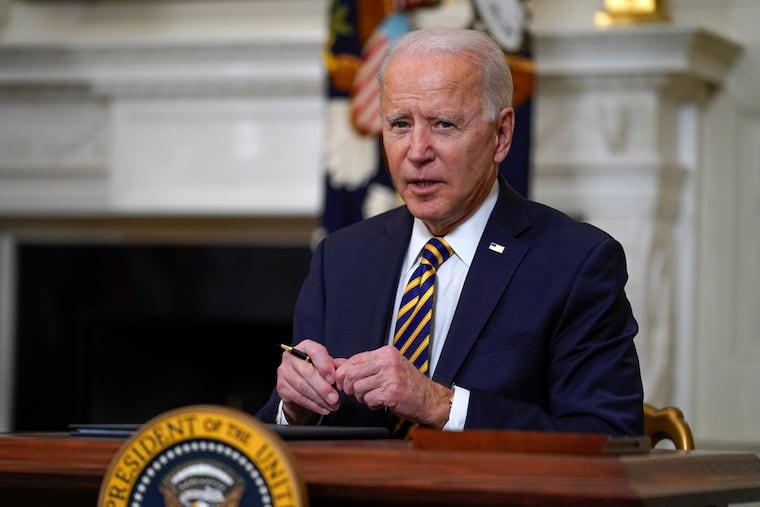Biden’s first 100 days of foreign policy deserve good grades | Trudy Rubin
When it comes to foreign policy, Biden earns an A-/B+ on COVID-19, China and Russia, personnel, and policy process — but on Afghanistan and Iran, I have doubts.

The 100 days benchmark by which to measure the performance of new presidents arrives on April 30 for President Joe Biden.
The tradition originated in Franklin Delano Roosevelt’s first term and was disavowed by John F. Kennedy in his inaugural as a premature judgment. But fair or not, here goes with my assessment on his initial conduct of foreign policy, which I find largely praiseworthy with a couple of major concerns.
Policymaking process, personnel, and professionalism: A
The country can be grateful that, from the get-go, Biden restored sanity and professionalism to the foreign policy-making process. Biden has been tougher than President Barack Obama — and light-years more savvy and strategic than the erratic tweeter who made foreign policy in 280-word bursts.
In Secretary of State Antony Blinken and national security adviser Jake Sullivan, along with Defense Secretary Lloyd Austin, and their deputies, the White House opted for deep experience and expertise (although many key posts are still unfilled).
» READ MORE: By pulling troops from Afghanistan Biden risks a humanitarian disaster | Trudy Rubin
This is a team that will work together on policy, unlike the chaos of the previous White House, where the president made war on intelligence agencies and fired top national security officials like a reality TV host.
Reviving alliances in Europe and Asia: A-
Nothing so exemplified Donald Trump’s lack of strategic thinking than his disdain for NATO and insults to key European and Asian leaders.
It will be hard to rebuild trust, and there is still discord on China policy. But without tight coordination with allied democracies –— including the new “Quad” grouping of India, Japan, Australia, and the United States — America cannot push back against China’s unfair trade policies or its efforts to set new authoritarian rules for the world.
Combatting the pandemic: A-/B+
Yes, the White House was slow to share excess vaccines with nations that are short. But in fairness, Biden took office in the wake of a shocking dereliction of COVID-19 duty by Trump. While miraculous vaccines were produced on Trump’s watch, there was no national strategy for delivery.
So Biden’s focus first had to be on vaccinations at home, including in underserved communities. Given that China and Russia have crowed about Trump’s COVID-19 failures as indicative of an America in decline, this domestic focus was crucial not only for public health but to show the world that the United States was still competent. Now the White House is moving to share access to American overstock, and will no doubt reexamine the issue of a World Trade Organization waiver on intellectual property rights to vaccines.
China policy: B+
On China, a policy still in development, it would be fairer to give an incomplete. But so far, contrary to the GOP mantra of Biden as “soft” on China, Biden has been tough in a far shrewder way than Trump.
Biden recognizes that a coherent China strategy must extend beyond exporting more soybeans and imposing trade sanctions (he hasn’t lifted Trump’s, but is working on a smarter trade policy). To compete with China, America needs far better infrastructure, a huge public and private investment in R&D for cutting edge technologies, and a functional government.
Not yet clear is where Biden sets red lines on the explosive issue of Taiwan, or the South China Sea, and how he can, or should, back up his human rights demands on Hong Kong and Xinjiang.
Russia relationship: A+
What a relief to have a president who doesn’t fawn over Vladimir Putin. Biden has talked tough on Ukraine and imposed sanctions where needed, although he has yet to convince Germany to harden its stance toward the Kremlin. One can only hope he’ll tell Putin face to face that the death of opposition leader Alexei Navalny in prison will poison their relationship for good.
Ending Afghanistan war: C-
I understand Biden’s urge to end “forever wars,” but believe a small troop presence of 3,000 was not a war but an insurance policy. It could provide the airpower (the Afghans have no airforce) and the intelligence to prevent a Taliban takeover and the murder or suppression of tens of thousands of women and girls.
» READ MORE: The link between Navalny and Biden's policy on Russia | Trudy Rubin
Reviving nuclear deal with Iran: Incomplete
On Iran, I would support a return to the Joint Comprehensive Plan of Action (JCPOA) nuclear deal, but only if Iran returns fully in return for some sanctions relief, and agrees to a second negotiation on extending sunset clauses and curbing missiles before all sanctions are lifted. The Biden team has talked about that second round, but there is no sign Iran is willing.
Other issues like North Korea are still in the review stage, and on climate change, the words are great, but Biden is reaching far, and China’s current positions undermine the global effort.
Yet, overall, I’d say that Biden’s first 100 days have delivered more than many people, myself included, expected. The next three years and nine months will be the real test.